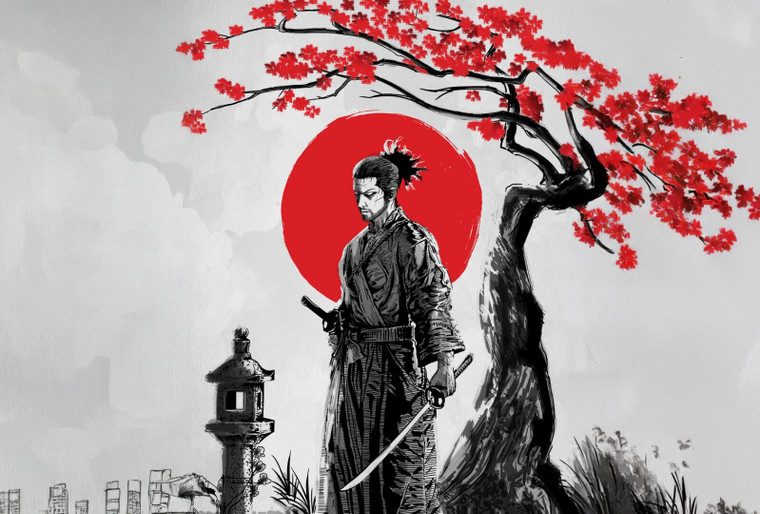Tacticians Through the Ages | Rōnin Miyamoto Musashi
Posted by Warrior Poet Society on Apr 26th 2024
In a world where TikTok increasingly shapes worldviews and where some young adults can't tell you a thing about World War 2 or any of the American wars of the last two centuries, the study of history is increasingly important. This includes the histories of other nations (like King David and King Leonidas). Recently I picked up some books to learn about a central warrior figure out of Japan's history chronicles--Miyamoto Musashi.
Miyamoto Musashi was a 15th century Rōnin--a sort of Samurai free agent. He wasn't serving a feudal lord or answering to any sort of authority, and he was a brilliant fighter and tactician who began his warrior career at the age of 12 fighting duels. He was well known for a two-sword method of fighting and for defeating more than 60 fellow warriors in Japan.
What I Admire About Miyamoto Musashi
Because I'm a tactician myself, I admire the tactical wisdom, even brilliance, of Musashi's warrior mindset. Fighting tactics and principles don't really change all that much over time or from culture to culture, so there was a lot to glean from his approach to dealing with enemies and battlefield chaos.
This medieval Japanese warrior maintained the admirable practice of careful, patient observation of the warrior's practice. Though he didn't submit himself to a lord or master, he did submit himself as a diligent student of his art and craft. He was likely a genius similar to our greatest warriors and professional athletes today. Thankfully he was willing to pass down his knowledge in written form.
Learning how to see in battle. "In setting the gaze, make it large and set it broadly. There are two kinds of gaze, perceiving and looking. The gaze that perceives is strong. The gaze that looks is weak. To see far away things as if they're close and to see things that are close as though they're far away is the key in strategy." In other words, you need to be able to take in an entire battlefield in a glance, understand the big picture, and then still have attention to detail in the small things. Don't get tunnel vision.
Speed of execution comes from mastery and efficiency of skill. "When skilled people do something, they may appear to move quite slowly, but they never miss a beat. In anything when trained people do it, they never appear to be rushed." In other words, the old saying "slow is smooth and smooth is fast." Don't go for speed. Go for efficiency, for perfect execution and mastery, and speed will be a natural byproduct.
RELATED VIDEOS | The Spartan King Leonidas and Dienekes • Israel's Warrior King David
Fighting style is developed for advantage, not entertainment. "These other [fighting] styles embellish and elaborate the fighting arts, rendering them flowery solely for the intention of making a living. Because they are fabrications made up to be sold, how can they possibly be the true way?" Musashi's disdain for flowery fighting styles really appealed to my pragmatic sensibilities. He was obviously a dangerous guy whose sole objective in fighting was to win--which often meant the other guy died. Of course, unlike Musashi, when we "win" it's to protect innocent lives. It's not in the pursuit of our own glory and reputation as undefeated killers of our opponents.
And this gets to some of the issues I have with Musashi's way of life and perspective on reality.
Where (I Think) Musashi Went Wrong
I realize I'll get a little heat from the Musashi fans out there who love his life and work. So, first let me concede the possibility that I might be wrong. I might be misunderstanding the point of what Musashi stood for and of what he was saying in his written works.
I realize we all have cultural lenses through which we see and act in the world, but hopefully i'm not committing chronological snobbery in my analysis and critique.
However, having said all that, I don't think Musashi really exhibited the Warrior Poet ideal. He didn't seem to stand for a higher purpose, and he seemed to be driven by arrogance, vanity, and the glory of being the best fighter around.
So while I admire his tactical genius, I can't say he's a great man to emulate otherwise. I realize I could be wrong about this, and I'm comfortable with you disagreeing on my assessment.
RELATED READING | Miyamoto Musashi by David Groff • The Book of Five Rings by Miyamoto Musashi
But Musashi didn't seem interested in loving and protecting others. He seemed to reject systems that espoused a higher power. In fact, he seemed to say that his way of viewing the world superceded any other system of thought.
In spite of all that, though, his writings are filled with value for the tacticians out there who want to gleen from the observations and insights of a life spent as, seemingly, one man against the world.
Musashi knew how to Train Hard. Train Smart. And in some ways he was probably striving to Live Free. But can you really do that when you're living for yourself? What do you think?

